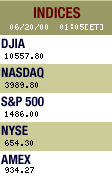| Corporate Financial Healthcare Technology | |
| Stock of the Day Tip of the Day Periscope | |
 for more information | |
|
FARM SCENE: Irrigation costs growing for farmers
Drought conditions have passed the one-year mark in some parts
of Nebraska. Significantly below-average rain and nonexistent
subsoil moisture have made for a heavy irrigation season.
Jon and Vicky Langenberg farm southeast of Norfolk and run 13
center-pivot irrigation pumps. About half are diesel-powered and
the others electrical.
The cost of running the electrical irrigation pumps is slightly
lower than last year, the Langenbergs said, but diesel fuel is
about 33 percent higher.
The Langenbergs said each of the 13 pumps may run up to 52 total
days because of the extended drought, or nearly 1,250 hours per
pump.
A pivot that pumps 800 gallons of water a minute can take three
days to apply one inch of water to a field. About 4,000 gallons of
water are required to produce a bushel of corn.
Using 100 gallons of diesel fuel per pump, per day for 52 days,
the cost could run $5,200 for each of the diesel pumps for the
growing season. The Langenbergs figure that is an increase of
$1,560 per pump.
"Who would have guessed that diesel fuel would have gone to $1
per gallon?'' Jon said. "And who would have guessed that corn
would drop to $1.40 a bushel?'' Vicky added.
Jon Langenberg has farmed on his own since 1982 and the couple
share in the fieldwork.
They farm 1,700 acres of irrigated corn and soybeans, plus 1,200
acres of dryland corn and soybeans and custom-work an additional
500 acres.
Jon Langenberg examined his corn last week and found variation
within rows of irrigated corn and dryland ears about half the size
of the irrigated ears with limited kernel development.
"The ears just aren't going to be there,'' he said. "You're at
the mercy of Mother Nature, especially as to what your dryland
yields will be.''
Langenberg said one of his irrigation motors had already logged
900 hours since April.
With corn and soybeans at a critical stage of development,
pivots may need to run at least two more weeks, he said. Beans
would probably benefit more from rain than corn at this point.
Pivot pumps and combines use diesel at the off-road farm price,
which is exempt from state and federal highway taxes. but the
diesel fuel needed to haul grain to the elevator and bins includes
the 48.3 cent-per-gallon highway tax. That fuel currently costs
about $1.40 per gallon.
Langenberg said he questions the future of the family farm.
"There's a lot of overhead,'' he said.
| ||
|
© , Fox Market Wire. All Rights Reserved Sitemap | Terms |